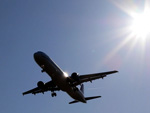Passengers win rights to compensation for cancelled flights
 In a landmark hearing, judges at Europe’s highest court have ruled that passengers must be compensated if an airline cancels a flight for technical reasons, unless “extraordinary” events are to blame.
In a landmark hearing, judges at Europe’s highest court have ruled that passengers must be compensated if an airline cancels a flight for technical reasons, unless “extraordinary” events are to blame.
The judgment at the European Court of Justice means that airlines will no longer be able to use routine technical problems as an excuse for trying to avoid their legal obligation to passengers.
The judges said that it is up to the airline to prove that the circumstances are “extraordinary”, which it called events such as terrorism or sabotage or a hidden manufacturing fault which suddenly comes to light.
The ruling follows a claim against Alitalia brought by an Austrian family. They took action when their Alitalia flight from Vienna to Rome was cancelled five minutes before it was scheduled to take off. As a result they missed a connecting flight to Brindisi. The Alitalia plane’s defect had been discovered the day before.
Alitalia refused to pay the compensation of 250 euros and 10 euros for telephone charges, a court statement said on Monday.
But the judges decided that the airline’s definition of such circumstances - “a complex engine defect in the turbine” - did not excuse it of the obligation to compensate passengers.
ADVERTISEMENT
The European Court said “technical problems which come to light during maintenance of aircraft or on account of failure to carry out such maintenance do not constitute, in themselves, ‘extraordinary circumstances’”.
It continued: “It is not ruled out that technical problems are covered by ‘exceptional circumstances’ to the extent that they stem from events which are not inherent in the normal exercise of the activity of the air carrier concerned and are beyond its actual control.”
However governing bodies have hit out at the decision. The European Regions Airline Association (ERA) says the European Commission is putting passenger rights ahead of passenger safety, and means airlines are now faced with additional commercial pressures which are unnecessary and wholly avoidable. There will be some occasions, in marginal conditions, where knowledge and experience would otherwise dictate that it would be more prudent not to fly.
“I am appalled that the European Commission has welcomed this ill-conceived judgement from the ECJ. Members of the ECJ cannot be expected to understand the serious safety implications of their judgement: the European Commission can,” says ERA Director General, Mike Ambrose.
He adds: “The ECJ judgement applies needless commercial pressure on crews to accept operations that might comply with all existing safety regulations but which, when all circumstances are considered, are contrary to the aircraft commander’s instincts and experience for safe flight.”
——-

